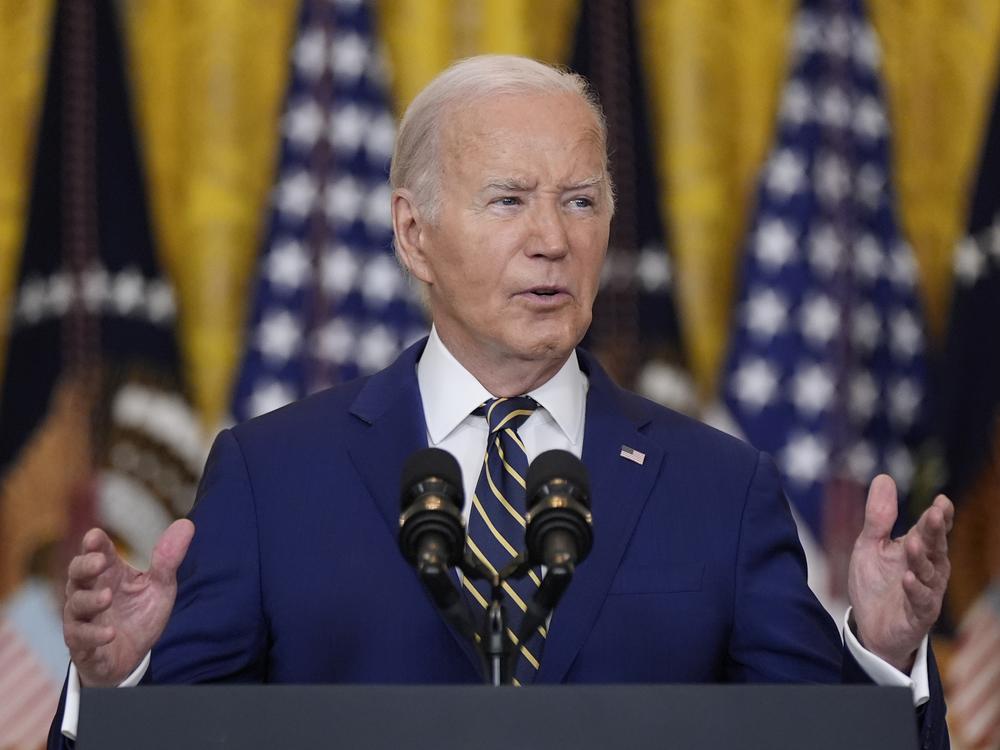Section Branding
Header Content
Biden's plan will shield undocumented spouses of U.S. citizens from deportation
Primary Content
President Biden is set to announce Tuesday new executive actions that will offer protection against deportation to an estimated half a million undocumented spouses of U.S. citizens.
The plan grants "parole in place" to undocumented people who have been in this country for at least 10 years. This measure will also allow eligible immigrants to apply for legal permanent status.
Additionally, it would extend a path to legality to noncitizen minors, and stepchildren of American citizens.
These executive actions include providing eligible immigrants with work permits.
Biden’s plan intends to keep families together, said senior White House officials who asked not to be identified because the information they provided will be announced on Tuesday by the president.
“These actions will promote family unity and strengthen our economy, providing a significant benefit to the country and helping U.S. citizens and their noncitizen family members stay together.”
This plan comes two weeks after other executive actions severely restricting asylum for most undocumented immigrants were put in place. The administration has said that while securing the southern border is a priority, so is fixing the immigration system for families in America.
Contrary to popular belief, undocumented immigrants cannot simply marry U.S. citizens to obtain legal status.
For mixed-status marriages, this has meant that attempts to legalize could end up in long-term separation of families.
Relief for Millions of Americans
Alejandro Paz Medrano and his wife, Erin Messinger, met nearly 20 years ago in Pennsylvania, when Medrano, originally from Mexico, took an English course.
In 2016, they got married.
In many ways, their life together has been like other couples: they have different tastes in food, Messinger always falls asleep while watching movies, and Medrano snores at night.
But they’ve also experienced terrifying moments.
The time when U.S. Immigration and Customs Enforcement agents knocked on their door, but they never opened it.
The time when a police officer pulled over Medrano for driving a company car with expired tags, and he panicked about the prospect of deportation.
And multiple occasions when he’s had to quit a job because a promotion would have meant having to show proof of legal status.
“It’s been frustrating, scary,” Medrano tells NPR in Spanish. “Every day we kiss each other goodbye and we don’t know if it’s the last one.”
He says not having a legal presence in the U.S. has influenced all aspects of his married life.
For instance, the couple decided to not have children because of the fear of Medrano getting deported.
“I don’t feel capable of being responsible for a divided family,” he said while tears came down his face during a video interview with NPR. “I know what it feels to be far away from your family, and I could not leave my children abandoned.”
The plan the White House is to announce today could change his life. He would be able to drive without fear of getting pulled over, get a stable job, or start a family, he said.
Who is eligible under Biden’s plan?
The plan grants parole in place to undocumented people who have been in the U.S. for 10 years and have been married to a U.S. citizen since June 17 or prior. It does not apply to immigrants who have been previously deported.
According to the communication distributed Monday by the White House, nearly 500,000 undocumented spouses would qualify for this relief. Additionally, 50,000 non-citizen stepchildren with a U.S. citizen parent would also be eligible for this protection.
Those who are eligible will have their case assessed by the Department of Homeland Security. If approved, they’ll be given three years to apply for permanent residency.
'This is not amnesty'
Parole authority is an executive power, meaning a different administration could pause Biden’s order.
Erica Schommer, a law professor at St. Mary’s University Immigration and Law Clinic in San Antonio, Texas, says “the outlines of that authority are that it has to be on a case-by-case basis and so certainly someone else in the White House could end any such program.”
“This is not some sort of blanket amnesty that just automatically converts a whole bunch of people into residents or citizens,” she says.
As it has happened with other immigration-related measures, this plan is likely to be challenged in court.
Advocates say it’s a historic moment
“Employers are thrilled”, says Rebecca Shi, executive director of the American Business Immigration Coalition. “We have a very tight labor market. And for years, employers have been saying, hey, we need to have a path to legal status for people that have been working, paying taxes, and are now married or have U.S. citizen children.”
She added: “a path to legal status for these workers will be able to raise wages for all, reduce inflation, and stabilize our workforce.”
Shi grew up in a mixed-status family: She and her father were U.S. citizens, but her mother, who had been a doctor in her native China, was undocumented. When she came to the U.S., she had to work in restaurants, off the books.
She speaks candidly about the emotional impact of having an undocumented parent, from not being able to take trips together, and living in terror of having her mother deported. She recalls her mother getting rear-ended by a car. “She just ran. She ran two miles and called me. And I had to go and find the car.”
DACA recipients will get expedited access to visas
Tuesday's announcement marks the 12th anniversary of DACA, the program created by former president Barack Obama that gave temporary protection to undocumented immigrants who were brought to the U.S. as minors.
According to the White House plan, immigrants –also known as Dreamers– who have earned a degree at a U.S. institution of higher education, and who have received an offer from a U.S. employer in a field related to their degree, can more quickly receive a work visa.

